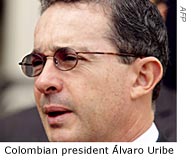New York, May 15, 2007— The Committee to Protect Journalists called on Colombian authorities today to fully investigate the illegal tapping of journalists’ telephone lines. The government acknowledged on Monday that the national police have improperly listened in on the telephone conversations of public officials, opposition members, and journalists.
“We are very concerned about the allegations of illegal wiretapping of journalists’ telephones during this crucial time in Colombian politics,” said CPJ Executive Director, Joel Simon. “Fear of surveillance could have a chilling effect on the Colombian press, which is already working in an environment of widespread self-censorship.”
The issue emerged piecemeal after the national newsweekly Semana reported last week that intercepted conversations showed that right-wing paramilitary leaders engaged in criminal activity while in maximum-security prisons. The government said Monday that members of Dipol, the police intelligence service, had illegally taped the telephone conversations and leaked them to Semana. In its statement, the government also said that members of Dipol have recorded for at least two years the conversations of people who are not under investigation, “including government officials, members of the opposition, and journalists.”
President Alvaro Uribe’s government condemned the practice as “totally unacceptable, illegal, and contrary to the policy of the government.” The government has ordered an internal investigation, and both the director of the national police, Gen. Jorge Daniel Castro, and the director of intelligence, Gen. Guillermo Chaves, have resigned.
Hollman Morris, an independent journalist and producer of the weekly news show “Contravía” on television station Canal Uno, told CPJ that he believes his phone line was tapped. In a September 2006 letter, reviewed by CPJ, the director of the telephone company Empresa de Telecomunicaciones de Bogotá warned Morris that his telephone line had been tampered with. The letter said that it could not determine if the tampering was intended to intercept his conversations. Morris filed a complaint with the national police asking them to investigate the incident. In October, Morris received a response from the police, also reviewed by CPJ, stating that his telephone lines were not being tapped. Morris, recognized for his investigative reporting on Colombia’s civil conflict, has been the subject of anonymous threats and harassment since 2005.
The wiretapping accusations come at a critical time for Uribe’s administration. On Monday, 20 politicians and business leaders were arrested on charges of criminal conspiracy for their links with paramilitary leaders, The Associated Press reported. The arrests bring to 14 the number of officials implicated in what has been called the “para-politics” scandal.
On March 15, 2006, President Alvaro Uribe met with a CPJ delegation in Bogotá and expressed support for journalists who report on corruption, saying that any government official who impedes the work of provincial journalists “is committing a crime against democracy.”
